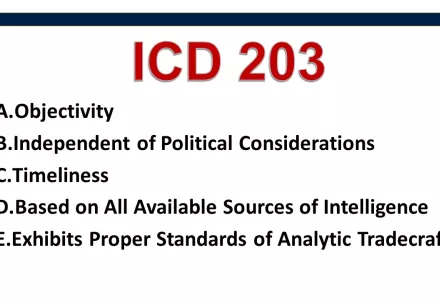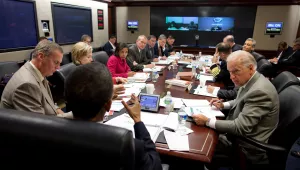The conference, organized by Recanati-Kaplan Fellow Barry Zulauf, is a one-day virtual event that will convene experts from the U.S., the U.K., Canada, and Australia, representing the government, private sector, and academia. The agenda is as follows.
8:00: Introductory Remarks
Natalie Colbert, Executive Director, Belfer Center for Science and International Affairs, HKS
Barry Zulauf, Recanati-Kaplan Intelligence Fellow from the Office of the Director of National Intelligence
8:30: Keynote
Morgan Muir, Deputy DNI for Mission Integration
9:00: Panel I: US Intelligence Community and Five Eyes Analytic Objectivity
Moderator: Katherine Helgerson, U.S. Chief of Analytic Integrity and Standards, United States
James Danvers, Professional Head of Intelligence Analysis, United Kingdom
John Pyrik, Justice Institute of British Columbia, Canada
Frank Babetski, Intelligence Community Analytic Ombudsman, United States
10:00: Break
10:15: Panel II: Academia, Government, and Business Analytic Objectivity Training
Moderator: Michael Miner, Harvard Intelligence Project
Michael Goodman, King’s College London
Genevieve Lester, U.S. Army War College
Catherine Sowerby, UK Intelligence Training Academy
Stephanie Carvin, Carleton University
Thomas Juneau, University of Ottawa
Stephen Marrin, James Madison University
11:45: Break
12:00: Keynote: The Hon. James Clapper, Senior Fellow, Belfer Center for Science and International Affairs, HKS
1:00: Break
1:15: Panel III: Best Practices and Changing the Paradigm for Government-Private Sector Analytic Objectivity: is politicization only a government problem?
Moderator: Maria Robson Morrow, Harvard Intelligence Project
Fran Moore, Analysis and Resilience Center for Systemic Risk
Randy Pherson, Pherson Associates
Tony Vassalo, Rand Corporation
Thea Gioe, Emergent Risk International
2:30: Break
2:45: Panel IV: Looking to the Future--Policy and Practice Changes for to Advance Objectivity and Avoid Politicization
Moderator: Calder Walton, Harvard Intelligence Project
Warren Davison, Acting Professional Head of Intelligence Analysis, United Kingdom
Nathan Evans, Office of National Intelligence, Australia
Emily Rapetti, Former Acting Deputy Analytic Ombudsman, United States
Katherine Helgerson, Chief of Analytic Integrity and Standards, United States
4:00: Closing Remarks and Way Ahead
Barry Zulauf, Recanati-Kaplan Intelligence Fellow from the Office of the Director of National Intelligence
4:30: Adjournment


